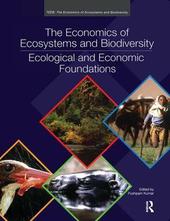
|
The Economics of Ecosystems and Biodiversity: Ecological and Economic Foundations
Hardback
Main Details
| Title |
The Economics of Ecosystems and Biodiversity: Ecological and Economic Foundations
|
| Authors and Contributors |
Edited by Pushpam Kumar
|
| Series | TEEB - the Economics of Ecosystems and Biodiversity |
|---|
| Physical Properties |
| Format:Hardback | | Pages:456 | | Dimensions(mm): Height 246,Width 189 |
|
| Category/Genre | Environmental economics
Applied ecology |
|---|
| ISBN/Barcode |
9781849712125
|
| Classifications | Dewey:333.95 |
|---|
| Audience | | Postgraduate, Research & Scholarly | |
|---|
| Illustrations |
Maps, line drawings, diagrams, tables, graphs
|
|
Publishing Details |
| Publisher |
Taylor & Francis Ltd
|
| Imprint |
Earthscan Ltd
|
| Publication Date |
1 October 2010 |
| Publication Country |
United Kingdom
|
Description
Human well-being relies critically on ecosystem services provided by nature. Examples include water and air quality regulation, nutrient cycling and decomposition, plant pollination and flood control, all of which are dependent on biodiversity. They are predominantly public goods with limited or no markets and do not command any price in the conventional economic system, so their loss is often not detected and continues unaddressed and unabated. This in turn not only impacts human well-being, but also seriously undermines the sustainability of the economic system. It is against this background that TEEB: The Economics of Ecosystems and Biodiversity project was set up in 2007 and led by the United Nations Environment Programme to provide a comprehensive global assessment of economic aspects of these issues. This book, written by a team of international experts, represents the scientific state of the art, providing a comprehensive assessment of the fundamental ecological and economic principles of measuring and valuing ecosystem services and biodiversity, and showing how these can be mainstreamed into public policies. This volume and subsequent TEEB outputs will provide the authoritative knowledge and guidance to drive forward the biodiversity conservation agenda for the next decade.
Author Biography
This volume is an output of TEEB: The Economics of Ecosystems and Biodiversity study and has been edited by Pushpam Kumar, Reader in Environmental Economics, University of Liverpool, UK. TEEB is hosted by the United Nations Environment Programme (UNEP) and supported by the European Commission, the German Federal Ministry for the Environment (BMU) and the UK Department for Environment, Food and Rural Affairs (DEFRA), recently joined by Norway's Ministry for Foreign Affairs, The Netherlands' Ministry of Housing (VROM), the UK Department for International Development (DFID) and also the Swedish International Development Cooperation Agency (SIDA). The study leader is Pavan Sukhdev, who is also Special Adviser - Green Economy Initiative, UNEP.
Reviews'A landmark study on one of the most pressing problems facing society, balancing economic growth and ecological protection to achieve a sustainable future.' Simon Levin, Moffett Professor of Biology, Department of Ecology and Evolution Behaviour, Princeton University, USA 'TEEB brings a rigorous economic focus to bear on the problems of ecosystem degradation and biodiversity loss, and on their impacts on human welfare. TEEB is a very timely and useful study not only of the economic and social dimensions of the problem, but also of a set of practical solutions which deserve the attention of policy-makers around the world.' Nicholas Stern, I.G. Patel Professor of Economics and Government at the London School of Economics and Chairman of the Grantham Research Institute on Climate Change and the Environment 'The [TEEB] project should show us all how expensive the global destruction of the natural world has become and - it is hoped - persuade us to slow down.' The Guardian 'Biodiversity is the living fabric of this planet - the quantum and the variability of all its ecosystems, species, and genes. And yet, modern economies remain largely blind to the huge value of the abundance and diversity of this web of life, and the crucial and valuable roles it plays in human health, nutrition, habitation and indeed in the health and functioning of our economies. Humanity has instead fabricated the illusion that somehow we can get by without biodiversity, or that it is somehow peripheral to our contemporary world. The truth is we need it more than ever on a planet of six billion heading to over nine billion people by 2050. This volume of 'TEEB' explores the challenges involved in addressing the economic invisibility of biodiversity, and organises the science and economics in a way decision makers would find it hard to ignore.' Achim Steiner, Executive Director, United Nations Environment Programme
|